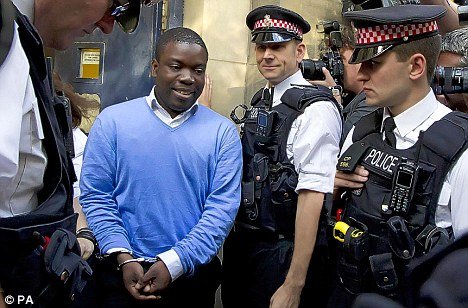Swiss banking giant UBS has admitted that the losses allegedly racked up by “rogue trader” Kweku Adoboli has risen from $2 billion to $2.3 billion.
UBS said the huge loss was caused by unauthorized trades on stock index futures made over the past three months.
It said the transactions Kweku Adoboli made were within normal limits and slipped through risk controls due to “fictitious trades” in complex financial instruments called exchange traded funds (ETFs), which were used to cover up losses.

According to UBS, “the true magnitude of the risk exposure was distorted” because the hedges that traders are required to put in place had been fabricated.
The bank also suggested that the trades involved “unauthorized speculative” bets on various S&P 500, Dax and Eurostoxx index futures, rather than on the Swiss franc, as some had thought.
Swiss banking giant also claims that the non-existent hedges entered into its records were “fictitious, forward-settling, cash ETF positions”, trades that had never actually been executed.
UBS also countered suggestions that it did not notice the trades until Kweku Adoboli came forward.
UBS said that Kweku Adoboli, who was charged on Friday with fraud and false accounting, had been responding to the bank’s inquiries.
It appears that the fraud came to light last Wednesday during a review of Kweku Adoboli’s trading book, which it has now unwound.
UBS has now launched an internal investigation regarding the failure of its risk systems.
UBS board of directors had set up a committee chaired by independent director David Sidwell, former chief financial officer at Morgan Stanley, to conduct an independent investigation into the trades and the bank’s control systems.
UBS stunned markets on Thursday when it announced unauthorized trades had lost it about $2 billion.
The figure was raised by a further $300 million on Sunday, and chief executive Oswald Gruebel said the alleged fraud would have consequences for strategy and possibly also for himself.
The huge loss is a heavy blow to the reputation of Switzerland’s biggest bank, which had just started to recover after its near collapse during the financial crisis and a damaging U.S. investigation into its aiding wealthy Americans to dodge taxes.
By 7:45 a.m. UBS shares were down 1.6% at 10.10 francs, outperforming a 2.6% slide on the European banking stocks index.
UBS CEO Oswald Gruebel said he would not be resigning, and said calls for his resignation were “purely political” and that he was “not thinking about stepping down”.
Gruebel added that while he bore ultimate responsibility, he did not feel “guilty” for failing to prevent the costly and embarrassing incident.
Gruebel defiant stance comes amid suggestions that Swiss regulators could tell the bank to hive off or close down its investment banking division, which houses the “Delta One” desk where Kweku Adoboli worked.
The Financial Services Authority and Swiss regulators have drafted in accountancy firm Deloitte to investigate the affair.
Meanwhile, UBS senior independent director David Sidwell, a former finance chief at JP Morgan Chase, is leading the bank’s own probe into the matter.
